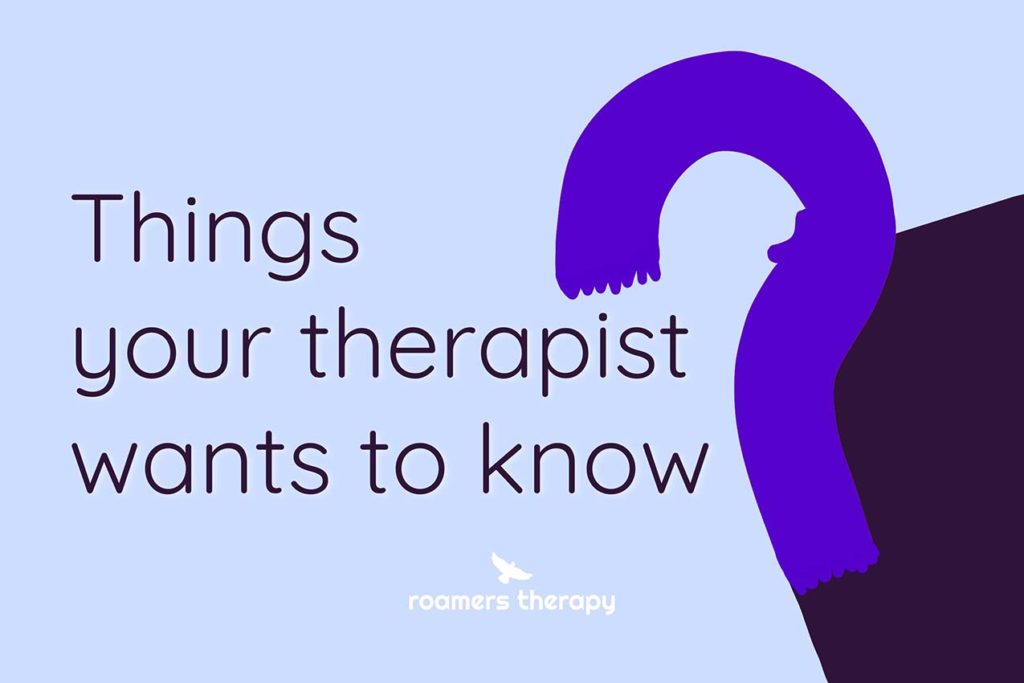Things your therapist wants to know
by Andres Carrion | August 2022
At times, it can become easy just to listen to what our therapist tells us during our sessions and to just accept what they have to say. We do this because we trust our therapists and view them as the expert in the room. However, what happens when a therapist’s insight or approach does not resonate with us?
It can feel difficult or even uncomfortable to even allude to our therapist that their approach, insight, or feedback does not resonate with us, which may lead us to try and push through session after session hoping that things will get better. The truth is research shows that when these issues are not addressed, they seldom improve. There is an inherent power dynamic that occurs in any provider-client relationship and therapy is no exception. Therapists are experts in many fields but they are definitely not the only experts in the room. As the client, you are the expert of your life because frankly, no one knows you like you know yourself. You have invaluable information that can drastically improve your relationship with your therapist and your progress in treatment.
Therapeutic relationships are very special, but also fragile. Ruptures can occur when our therapist says or does something that does not feel good to us, when their approach is not working for us, or when their reflections do not resonate with us. When such matters or other grievances are not addressed, we stop feeling as close or as safe with our therapist. This may make us feel resentful towards them if the issues persist and we may even become more resistant. All of these will derail, if not completely halt, our progress in therapy. On the other hand, when we provide feedback to our therapists, research shows that the therapeutic relationship and outcomes can improve substantially.
Therapists take the feedback we give them and incorporate it into their style because at the end of the day, they want to help us. However, we have to help our therapists help us. This includes trusting them enough to raise feelings of conflict.
Here are some ways to give feedback to your therapist on things that your therapist really wants to know:
- I have been noticing a difference since implementing that new technique.
- I do not think this approach is for me.
- I actually meant this, I don’t think that reflection fits how I was feeling.
- I felt offended when you said this….
- I am getting frustrated with the progression of therapy.
- I actually do not feel comfortable talking about this.
- I felt like you were implying this when you said…
- I do not like this new direction we have been taking.
At Roamers Therapy, our psychotherapists are here to support you through anxiety, depression, trauma and relationship issues, race-ethnicity issues, LGBTQIA+ issues, ADHD, Autism, or any challenges you encounter. Our psychotherapists are trained in Cognitive Behavioral Therapy, Dialectical Behavioral Therapy, Psychodynamic Therapy, Acceptance, and Commitment Therapy, Person-Centered Therapy, and Gottman Therapy.
Whether you’re seeking guidance on a specific issue or need help navigating difficult emotions, we’re ready to assist you every step of the way.
Contact us today to learn more about our services and schedule a session with our mental health professionals to begin your healing journey. To get started with therapy, visit our booking page.
First, decide if you’ll be paying out-of-pocket or using insurance. If you’re a self-pay client, you can book directly through the “Book Now” page or fill out the “Self-Pay/Out-of-network Inquiry Form.” If you’re using insurance, fill out the “Insurance Verification Form” to receive details about your costs and availability. Please let us know your preferred therapist. If your preferred therapist isn’t available, you can join the waitlist by emailing us. Once your appointment is confirmed, you’ll receive intake documents to complete before your first session.
This page is also part of the Roamers Therapy Glossary; a collection of mental-health related definitions that are written by our therapists.
While our offices are currently located at the South Loop neighborhood of Downtown Chicago, Illinois, we also welcome and serve clients for online therapy from anywhere in Illinois and Washington, D.C. Clients from the Chicagoland area may choose in-office or online therapy and usually commute from surrounding areas such as River North, West Loop, Gold Coast, Old Town, Lincoln Park, Lake View, Rogers Park, Logan Square, Pilsen, Bridgeport, Little Village, Bronzeville, South Shore, Hyde Park, Back of the Yards, Wicker Park, Bucktown and many more. You can visit our contact page to access detailed information on our office location.

